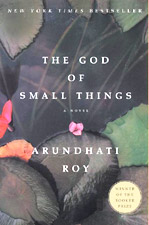 An Alabama high school pulled Booker Prize Winning The God of Small Things from the summer reading options after a parent claimed it was inappropriate. Arundhati Roy’s first novel, The God of Small Things, has been regularly hailed as an exceptional piece of literature, including by authors like John Updike, who compared it to a “Tiger Woodsian debut — the author hits the long, socio-cosmic ball but is also exquisite in her short game.”
An Alabama high school pulled Booker Prize Winning The God of Small Things from the summer reading options after a parent claimed it was inappropriate. Arundhati Roy’s first novel, The God of Small Things, has been regularly hailed as an exceptional piece of literature, including by authors like John Updike, who compared it to a “Tiger Woodsian debut — the author hits the long, socio-cosmic ball but is also exquisite in her short game.”
The father who made the complaint said he and his daughter chose the book because of the reviews they read online. But once his daughter was reading it she said it was not appropriate for school, and then he went through and cherrypicked moments out of context with which to prove his point. He then complained to the Principal who removed the books from the Summer Reading options before convening a committee to evaluate it. Details are sparse on who was on the committee in charge of evaluating the text, and district policy only notes that there needs to be a procedure for challenged material, but details aren’t apparent as to what that procedure is,
7.13 Selection of Instructional Materials and Materials for the School Libraries
The Superintendent is authorized to develop criteria for approval by the Board for selection of materials (other than textbooks) that are used in conjunction with student instruction and for circulation in school libraries. The Superintendent is further authorized to develop a procedure for review of objections to instructional and library materials.
While a parent has every right to say they are uncomfortable with a text for their child, and the child calling out discomfort with a text should be lauded for choosing handle a mature topic in a mature way, neither has the right to declare the book unacceptable based on their personal feelings. And to have it removed entirely from the Summer Reading list, where it was an optional choice, and there were automatically alternative assignments readily available, feels patently unfair to other students who may be looking for just that book to connect them to something larger, whether in literature or in life.
Roy’s The God of Small Things was briefly controversial when it was first published in the 1990s, with a lawyer in India suing Roy for obscenity. At the time of the lawsuit, which Roy was forced to leave an international book tour, “summoned to answer charges of obscenity in a backwater courtroom of Kerala, her Marxist-controlled home state and the setting of her book.” The New York Times interviewed Roy about the obscenity charge:
‘On one hand it’s so ridiculous,” she said in a telephone interview the other day from New Delhi, where she lives. ”On the other hand, any writer can be harassed in this way. It comes to the point where one citizen can hold literature to ransom.’
Despite the initial controversy over the obscenity charge, in the last two decades the book has long been considered a boon in academia for its beautiful prose layered over a complex plot, which offers the chance to discuss themes like social discrimination,misogyny, sexual abuse, betrayal, family dynamics, Indian history, and the caste system. Because of the intense themes the book deals with, like discrimination, it has moments which many find upsetting to read, and language can be employed which is intentionally vile. That’s why it is critical books be taken as a whole, not just a laundry list of the bad words, and sex scenes.